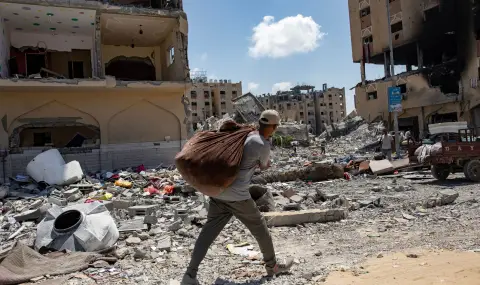"The people of Gaza are just very tired, exhausted and disgusted with reality . They hope the war will end and a ceasefire will be declared,'' said Abir, who currently lives in Nuseirat refugee camp in central Gaza. Meanwhile, however, ten months have passed since the start of the war, and Palestinians are finding it hard to believe anything.
Peace Efforts
Mediators from Qatar, Egypt and the US are currently working on a project for a ceasefire in Gaza and the release of the Israeli hostages. The daily bombings in Gaza and the almost non-stop search for a safe place amid the destruction leave Abir no time to think about the future. It is angry at Islamist militants from Hamas, a group the US, EU and others designate as a terrorist group.
“How can I support an organization that is not trying to stop war? "These people do not represent me," Abir told DV. “I want them to disappear and I am not the only one who thinks so. Who can support a movement that causes only death and destroys our lives?”. Criticism of Hamas in Gaza is intensifying, and some people are also posting angry posts on social networks.
“Criticisms of Hamas are many - they are heard on the streets, in the tents around the refugee camps, on social networks. There are several reasons for this,” explains journalist Fathi Sabah from Khan Younis. “The war has lasted much longer than expected and people can no longer bear its burden and its destructive consequences - daily life with lack of water and electricity, high prices, lack of income”.
Appalling conditions for Palestinians
Still, it is difficult to gauge exactly what people in Gaza think of Hamas. In 17 years of repressive rule by the de facto Hamas-led government, people have so far preferred to share their discontent in person, fearing repercussions. “Shortly before the war there were demonstrations in Gaza. People were unhappy with the deteriorating conditions and blamed Hamas. I guess now the discontent is much more pronounced,” says Khalil Shikaki, a sociologist from the occupied West Bank.
“The government and Hamas have drawn us into an unequal battle”, says Mahmoud, who has been forced to flee his birthplace several times. “Hamas has ruled Gaza for 17 years and created many social, economic and political problems,”, he says. “This is just another disaster they have caused us”.
There has always been both opposition and support for Hamas in Gaza. The Islamist group took over the enclave in 2007. Israel, and partly Egypt, tightened the blockade of Gaza, isolating the people there for many years.
Unclear preference picture
Recent polls show that Palestinians have mixed opinions about Hamas. The extreme situation in Gaza makes polling difficult. For example, it is absolutely impossible to conduct surveys in northern Gaza. According to a poll published in May, only 24% of people in Gaza have a positive view of Hamas. 70 percent say Palestine is moving in the wrong direction. Another polling agency shows a different result - support for Hamas, according to the Palestinian Policy Research Center, is 38%.
In the occupied West Bank, Hamas has seen an increase in support. However, all this remains entirely theoretical, as Palestinians last voted in 2006, when Hamas took over Gaza. According to sociologist Khalil Shikaki, those who supported Hamas before the war have not changed their minds. “They share the basic values of Hamas, they are religious, they do not believe in secularism. This does not change overnight”, says the expert. The Hamas group is also deeply rooted in society due to its social and charitable activities.
According to Ibrahim Madoun, a Palestinian analyst considered close to Hamas, the Islamist organization is aware of the criticism, but accepts it as an inevitable part of the struggle. “There is no doubt that this war is catastrophic for the people of the Gaza Strip, that the Israeli occupation is brutal and many want an end to the war,” says Madoun. “Sometimes they blame the occupation, and other times they blame Hamas. As long as there is war, these voices will be heard.
How will Gaza change after the war?
Continuous displacement of people and large-scale destruction throughout the Gaza Strip are undermining the enclave's social and governance structures. A total of 86 percent of people in Gaza have been evacuated since the start of the war, according to UN figures. As a result, local people report that crime has increased. The police under Hamas have largely disappeared as law enforcement has also become a target for the Israeli military.
Even if a truce is reached, the question remains of what lies ahead for Gaza. According to one survey, 80 percent of Palestinians in Gaza and the West Bank want a Palestinian government. Those critical of Hamas hope for change. “People are definitely not ready to accept Hamas rule again,” says Mahmoud. “The biggest catastrophe would be for Hamas to take power again after the war”.
Author: Tanya Kremer
